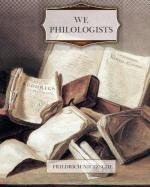It must be added, unfortunately, that Nietzsche’s observations in this book apply as much to England as to Germany. Classical teachers here may not be rated so high as they are in Germany, but their influence would appear to be equally powerful, and their theories of education and of classical antiquity equally chaotic. In England as in Germany they are “theologians in disguise.” The danger of modern “values” to true culture may be readily gathered from a perusal of aphorisms that follow: and, if these aphorisms enable even one scholar in a hundred to enter more thoroughly into the spirit of a great past they will not have been penned in vain.
J. M. Kennedy.
London, July 1911.
I
To what a great extent men are ruled by pure hazard, and how little reason itself enters into the question, is sufficiently shown by observing how few people have any real capacity for their professions and callings, and how many square pegs there are in round holes: happy and well chosen instances are quite exceptional, like happy marriages, and even these latter are not brought about by reason. A man chooses his calling before he is fitted to exercise his faculty of choice. He does not know the number of different callings and professions that exist; he does not know himself; and then he wastes his years of activity in this calling, applies all his mind to it, and becomes experienced and practical. When, afterwards, his understanding has become fully developed, it is generally too late to start something new; for wisdom on earth has almost always had something of the weakness of old age and lack of vigour about it.
For the most part the task is to make good, and to set to rights as well as possible, that which was bungled in the beginning. Many will come to recognise that the latter part of their life shows a purpose or design which has sprung from a primary discord: it is hard to live through it. Towards the end of his life, however, the average man has become accustomed to it—then he may make a mistake in regard to the life he has lived, and praise his own stupidity: bene navigavi cum naufragium feci . he may even compose a song of thanksgiving to “Providence.”
2
On inquiring into the origin of the philologist I find:
1. A young man cannot have the slightest conception of what the Greeks and Romans were.
2. He does not know whether he is fitted to investigate into them;
3. And, in particular, he does not know to what extent, in view of the knowledge he may actually possess, he is fitted to be a teacher. What then enables him to decide is not the knowledge of himself or his science; but
(a) Imitation.
(b) The convenience
of carrying on the kind of work which he had
begun at school.
(c) His intention of earning a living.




